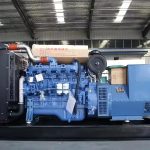Introduction:
Diesel generators play a crucial role in providing backup power during blackouts and emergencies. These generators are widely used in various industries, including healthcare facilities, data centers, manufacturing plants, and telecommunications. However, the reliability and efficiency of diesel generators can be compromised without proper maintenance practices. Traditional maintenance approaches such as reactive and preventive maintenance may not be sufficient to ensure optimal performance and minimize downtime. Predictive maintenance strategies offer a proactive and data-driven approach to monitor the condition of diesel generators and address potential issues before they escalate. This article explores the importance of predictive maintenance for diesel generators and discusses various techniques and technologies that can be employed to enhance their reliability and efficiency.
Importance of Predictive Maintenance for Diesel Generators:
Predictive maintenance for diesel generators involves the use of advanced technologies and data analysis to predict potential failures and schedule maintenance activities accordingly. By monitoring key parameters such as vibration, temperature, oil analysis, and load testing, maintenance teams can detect early signs of equipment degradation and take preventive actions to avoid unplanned downtime and costly repairs. Predictive maintenance not only extends the lifespan of diesel generators but also improves their overall performance and energy efficiency.
One of the primary advantages of predictive maintenance is its cost-effectiveness compared to reactive and preventive maintenance approaches. By identifying potential issues in advance, maintenance teams can plan and schedule maintenance activities during planned downtime, reducing the impact on operations and minimizing the risk of unexpected failures. This proactive approach helps organizations save time and resources by avoiding emergency repairs and costly equipment replacements.
Another benefit of predictive maintenance is its ability to optimize maintenance schedules based on the actual condition of the equipment. By using real-time data and analytics, maintenance teams can prioritize maintenance tasks according to the criticality of the components and the severity of the issues detected. This targeted approach ensures that resources are allocated efficiently and maintenance efforts are focused on areas that require immediate attention, improving the overall reliability and performance of diesel generators.
Techniques and Technologies for Predictive Maintenance of Diesel Generators:
Several techniques and technologies can be utilized to implement predictive maintenance strategies for diesel generators. These include:
1. Condition Monitoring: Condition monitoring involves the continuous monitoring of key parameters such as vibration, temperature, oil analysis, and fuel consumption to assess the health and performance of diesel generators. By analyzing these parameters in real-time, maintenance teams can detect abnormal patterns or deviations from normal operating conditions and take corrective actions to prevent equipment failures.
2. Remote Monitoring: Remote monitoring systems enable maintenance teams to monitor the status and performance of diesel generators from a centralized location. By using sensors and IoT devices, real-time data on key parameters can be collected and transmitted to a central dashboard for analysis. Remote monitoring allows maintenance teams to identify potential issues early and take proactive measures to prevent downtime.
3. Predictive Analytics: Predictive analytics uses historical data and machine learning algorithms to predict the future performance of diesel generators and identify potential failure modes. By analyzing patterns and trends in the data, maintenance teams can forecast equipment failures and schedule maintenance activities accordingly. Predictive analytics can also help optimize maintenance schedules and improve the overall reliability of diesel generators.
4. Thermal Imaging: Thermal imaging technology can be used to detect overheating components and potential electrical faults in diesel generators. By capturing infrared images of the equipment, maintenance teams can identify hotspots and abnormal temperature distributions that indicate potential issues. Thermal imaging helps maintenance teams diagnose problems early and take corrective actions to prevent equipment failures.

5. Ultrasonic Testing: Ultrasonic testing is used to detect leaks, cracks, and structural defects in diesel generators by analyzing the ultrasonic waves emitted by the equipment. This non-destructive testing technique can identify hidden defects that are not visible to the naked eye, allowing maintenance teams to address potential issues before they escalate. Ultrasonic testing is an effective tool for detecting early signs of equipment degradation and ensuring the reliability of diesel generators.
Case Studies and Best Practices:
Several organizations have successfully implemented predictive maintenance strategies for diesel generators and achieved significant improvements in equipment reliability and performance. One such case study is a manufacturing plant that implemented a remote monitoring system to track the performance of its diesel generators in real-time. By analyzing key parameters such as fuel consumption, temperature, and vibration levels, the maintenance team was able to detect a faulty fuel injector and schedule a replacement before it caused a breakdown. This proactive approach helped the plant avoid unplanned downtime and saved thousands of dollars in repair costs.
Another best practice in predictive maintenance is the use of predictive analytics to optimize maintenance schedules and prioritize critical tasks. By analyzing historical data and equipment performance trends, maintenance teams can identify patterns that indicate potential failures and take preventive actions to address them. This data-driven approach allows organizations to allocate resources efficiently and reduce the risk of unexpected equipment failures, improving the overall reliability of diesel generators.
75kw diesel generator for remote humanitarian projects :
Predictive maintenance strategies offer a proactive and data-driven approach to monitor the condition of diesel generators and optimize maintenance schedules. By leveraging advanced technologies such as condition monitoring, remote monitoring, predictive analytics, thermal imaging, and ultrasonic testing, organizations can enhance the reliability and performance of their diesel generators and minimize the risk of unplanned downtime. Implementing predictive maintenance practices not only extends the lifespan of diesel generators but also reduces maintenance costs, improves energy efficiency, and enhances overall operational efficiency. Organizations that prioritize predictive maintenance for their diesel generators can gain a competitive edge by ensuring uninterrupted power supply and minimizing disruptions to critical operations.
